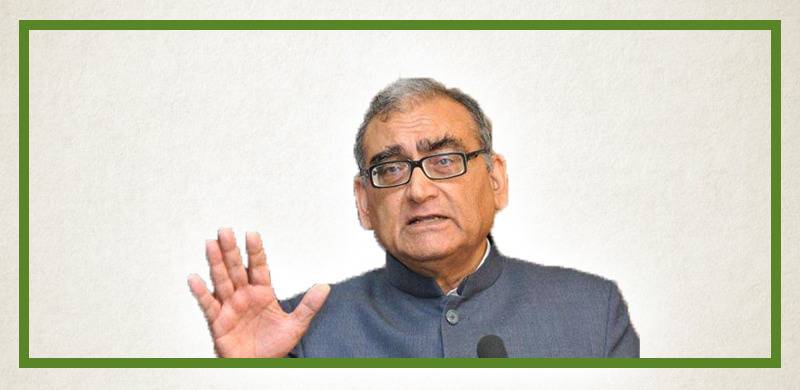
The petitions challenging the detention of Kashmiri leaders Omar Abdullah and Mehbooba Mufti have been fixed for hearing before the Supreme Court on 5th March. An important question in these cases is how should the Attorney General of India (or the Solicitor General of India) who appears for the Union Govt behave?
In my opinion, the duty of the Attorney General or Solicitor General is to help the Court lay down the correct law, not to justify the action of the government.
I may give two examples in this connection:
(1) Pt. Kanhaiya Lal Mishra was the Advocate General of UP for many years. When the Socialist leader Dr Ram Manohar Lohia was arrested and detained for inciting farmers in UP not to pay the enhanced water rate from canals, he challenged his detention by filing a habeas corpus petition in the Allahabad High Court, and Pt Mishra appeared on behalf of the UP Govt.
Lohia decided to argue his case himself, though he was not a lawyer. Thereupon Pt Mishra started going to the jail where Lohia was incarcerated, and assisted Lohia in preparing his case. He gave Lohia copies of many decisions of various courts in India, UK, and USA which were in his favour, and which he could cite.
Many people were astounded at what Pt Mishra was doing since he was appearing for the respondent State of UP in the case, but he responded that since Lohia was not a trained lawyer, and since for a correct decision the version of both sides must be presented properly before the court, he was only helping the course of justice. He said that as Advocate General his task was not to win cases but to assist the court to lay down the correct law.
Due to Pt Mishra’s assistance Lohia won his case, and his detention was quashed by the Court, vide Ram Manohar Lohia vs Supdt, Central Prisons.
(2) Govind Swaminathan was the legendary Advocate General of Tamil Nadu. A petition was filed in the Madras High Court by a student who said he was wrongly denied admission to a certain educational course. Though Mr Swaminathan was appearing for the Tamilnadu government, he frankly admitted in court, after studying the case thoroughly, that his government had made a mistake, and the student deserved admission. Thereupon the court directed admission of the student.
Many more such examples can be given.
In my opinion, in the cases of the Kashmiri leaders before the Supreme Court, the Attorney General (or Solicitor General) should not try to justify the detention orders, but should frankly state in court that these orders are illegal in the light of the Brandenburg test.
If they do so, the Attorney General or Solicitor General will not only enhance their own reputation, but will also restore the image of the court, which presently lies sullied in view of its recent verdicts and acts of some judges, and once again resurrect the Court as the guardian of the Constitution and liberties of the people.
In my opinion, the duty of the Attorney General or Solicitor General is to help the Court lay down the correct law, not to justify the action of the government.
I may give two examples in this connection:
(1) Pt. Kanhaiya Lal Mishra was the Advocate General of UP for many years. When the Socialist leader Dr Ram Manohar Lohia was arrested and detained for inciting farmers in UP not to pay the enhanced water rate from canals, he challenged his detention by filing a habeas corpus petition in the Allahabad High Court, and Pt Mishra appeared on behalf of the UP Govt.
Lohia decided to argue his case himself, though he was not a lawyer. Thereupon Pt Mishra started going to the jail where Lohia was incarcerated, and assisted Lohia in preparing his case. He gave Lohia copies of many decisions of various courts in India, UK, and USA which were in his favour, and which he could cite.
Many people were astounded at what Pt Mishra was doing since he was appearing for the respondent State of UP in the case, but he responded that since Lohia was not a trained lawyer, and since for a correct decision the version of both sides must be presented properly before the court, he was only helping the course of justice. He said that as Advocate General his task was not to win cases but to assist the court to lay down the correct law.
Due to Pt Mishra’s assistance Lohia won his case, and his detention was quashed by the Court, vide Ram Manohar Lohia vs Supdt, Central Prisons.
(2) Govind Swaminathan was the legendary Advocate General of Tamil Nadu. A petition was filed in the Madras High Court by a student who said he was wrongly denied admission to a certain educational course. Though Mr Swaminathan was appearing for the Tamilnadu government, he frankly admitted in court, after studying the case thoroughly, that his government had made a mistake, and the student deserved admission. Thereupon the court directed admission of the student.
Many more such examples can be given.
In my opinion, in the cases of the Kashmiri leaders before the Supreme Court, the Attorney General (or Solicitor General) should not try to justify the detention orders, but should frankly state in court that these orders are illegal in the light of the Brandenburg test.
If they do so, the Attorney General or Solicitor General will not only enhance their own reputation, but will also restore the image of the court, which presently lies sullied in view of its recent verdicts and acts of some judges, and once again resurrect the Court as the guardian of the Constitution and liberties of the people.
